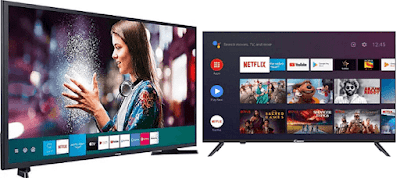Difference Between **Smart TV** and **Android TV**
While **Smart TVs** and **Android TVs** both offer internet connectivity and the ability to run apps, the platforms they use, the features they offer, and their user experiences differ significantly.
1. **Smart TV**:
**Platform**:
A **Smart TV** refers to any TV with built-in internet capabilities and an operating system that supports apps like **YouTube**, **Netflix**, and **Hulu**. Unlike Android TV, Smart TV is not tied to a single operating system. Manufacturers often develop their own platforms for their smart TVs.
**Built-in Systems**:
Each TV manufacturer tends to use its own proprietary system. Examples include **Tizen** by **Samsung**, **webOS** by **LG**, and **My Home Screen** by **Panasonic**. These systems come pre-installed and vary in terms of functionality and user interface.
**App Availability**:
While Smart TVs offer app stores, the range of apps may be **limited** compared to Android TV. You’ll likely find popular streaming apps, but the choice beyond that is often restricted to what the manufacturer supports.
**Updates**:
Updates are usually less frequent and depend heavily on the manufacturer. This can mean that Smart TVs become outdated faster when new apps or services are released.
**Voice Assistance**:
Some Smart TVs offer built-in voice assistants, but they may not be as integrated or comprehensive as Google Assistant on Android TV.
2. **Android TV**:
**Platform**:
**Android TV** is a specific type of Smart TV that runs on **Google's Android operating system**. It offers a more flexible and customizable experience compared to other Smart TV platforms.
- **App Availability**:
Android TV has **access to the Google Play Store**, which gives users a vast library of apps, including not only streaming services but also games, productivity apps, and more. This makes it far more versatile than many proprietary Smart TV platforms.
**Updates**:
Android TV benefits from **regular updates** directly from Google, which means new features, bug fixes, and security improvements are available over time, ensuring the platform remains up-to-date and functional.
**Google Ecosystem Integration**:
Android TV is designed to integrate seamlessly with other **Google services**. It offers deep integration with **Google Assistant**, enabling voice searches, content discovery, and smart home controls. Additionally, **Google Cast** is built in, allowing users to stream content from their phone, tablet, or computer to their TV.
**Customization**:
Android TV allows for more customization, including the ability to install third-party launchers and apps, making it more adaptable for different user preferences.
**Smart TV**:
A **Smart TV** is ideal for users who want a **simplified** experience with essential apps like Netflix and YouTube and are more focused on a specific manufacturer’s ecosystem, such as **Samsung** or **LG**.
**Android TV**:
**Android TV** is better suited for users who want **full access to a wide range of apps**, **frequent updates**, and **deep integration with Google services**. It's a good option for those who already use Google’s ecosystem and want more flexibility in their TV setup.
Each option has its own strengths, and your choice will depend on your preferences for app variety, system updates, and whether you value integration with Google products.

